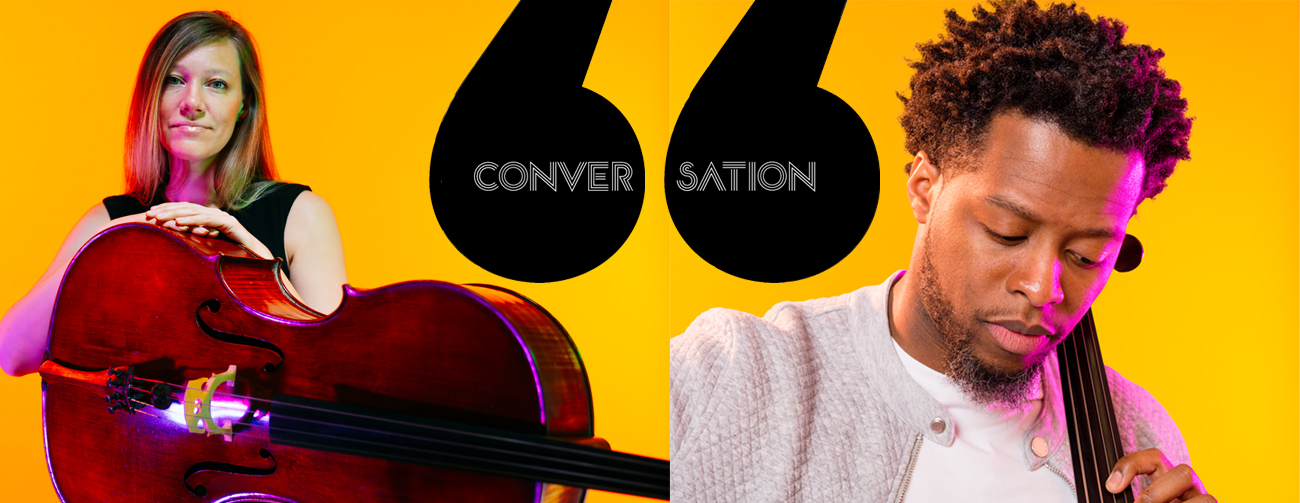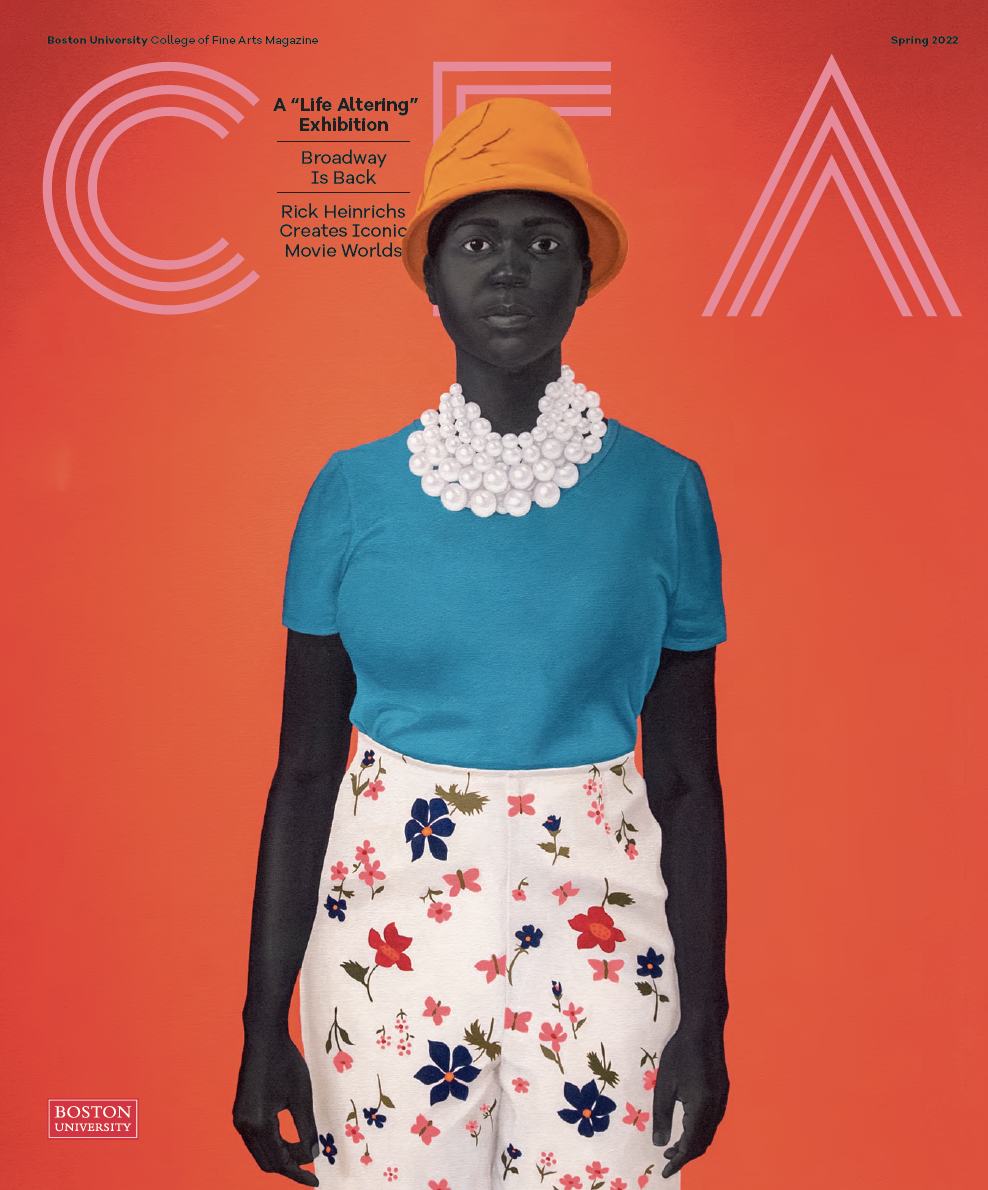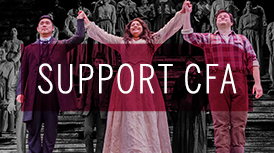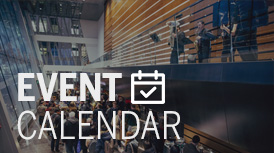Conversation
Laura Metcalf (’04) (left) and Kendall Ramseur (’12).
Cellists Kendall Ramseur, of Sons of Serendip, and Laura Metcalf discuss performing on America’s Got Talent, making music during the pandemic, and balancing work and parenthood
Edited by Mara Sassoon | Photos by Hannah Rose Osofsky (Ramseur) and Mamadi Doumbouya (Metcalf)
Cellist Kendall Ramseur had just stepped onstage at Madison Square Garden with his quartet, Sons of Serendip, to audition for season 9 of America’s Got Talent. This would only be the second time the quartet—whose members, Ramseur (’12), harpist Mason Morton (’12,’15), pianist and guitarist Cordaro Rodriguez (LAW’12), and lead vocalist Micah Christian (STH’12), met at BU—performed together in front of an audience.
“We didn’t know how the group would stand under pressure. I remember us walking out there, and I was terrified,” says Ramseur. But the fear was unfounded. The group’s performance of Keane’s “Somewhere Only We Know” brought audience members to tears and left the program’s celebrity judges in awe. Sons of Serendip wound up making it all the way to the 2014 finals, finishing in fourth place.
“Being on the show gave us a greater sense of purpose, like what we’re doing as musicians is making a difference,” says Ramseur, who is based in Cambridge, Mass. “We had no idea that stepping on that stage at Madison Square Garden was going to change the rest of our lives.” Since their TV debut, they’ve made four albums, including the 2015 holiday album Christmas: Beyond the Lights, which the New York Times called “silky beyond reason.”
Laura Metcalf (’04) is a New York–based cellist renowned for her solo and chamber music. She has performed with pop artists like Adele, John Legend, and Cher on late night programs and talk shows, and released her debut solo album, First Day, in 2016, which debuted at #7 on the Billboard classical chart. AllMusic called the album “sunny” and “energetic,” adding that by the end, “the listener is likely to have to be restrained from taking off into the stratosphere.” Metcalf is also part of multiple music projects, including the string quintet Sybarite5 and the cello and drum quartet Break of Reality, with whom she has toured worldwide, and the duo Boyd Meets Girl, with her husband, classical guitarist Rupert Boyd.
Ramseur and Metcalf spoke over Zoom in February about making music and balancing work and parenthood during the pandemic.
Laura Metcalf: So, tell me, who was your cello teacher at BU?
Kendall Ramseur: Marc Johnson, who was a member of the Vermeer Quartet. And yours?
LM: Mike Reynolds. He wrote me an email several months ago that he had listened to my debut solo album and we went back and forth.
KR: That’s awesome. When did you release that album?
LM: 2016. I recorded it at a studio in Virginia in the middle of nowhere. The studio is a converted church, so it’s got beautiful acoustics, and it’s so resonant.
KR: That’s really cool. I started working on my debut solo album in 2020, which I released in September. Believe it or not, because of the pandemic, I wound up recording everything at home. I went through courses and learned how to mix and master the album myself.
Kendall Ramseur (’12) is part of the nationally acclaimed and Billboard charting quartet Sons of Serendip. Ramseur and the group’s other members—harpist Mason Morton (’12,’15), pianist and guitarist Cordaro Rodriguez (LAW’12), and lead vocalist Micah Christian (STH’12)—met at BU.
LM: Wow. What’s the album called?
KR: It’s called Selah. It’s a Hebrew word that means “to pause.” I felt like it was the perfect title based off of what we were experiencing globally. The album works its way through my emotions around the pandemic, systemic racism, police brutality. 2020 was just rough. This album is my dealing with all of those emotions and feelings that I couldn’t quite put to words or articulate. Through music, I was able to just pour it all out.
How has it been for you through this pandemic with music and just life in general?
LM: I feel so lucky that I have a comfortable home, and I’ve been safe here with my family in New York. Before the pandemic, I was about to start this epic spring concert tour with the different groups that I’m involved in, I had a solo recital in the Caribbean planned, all these gigs I was looking forward to. But I feel proud that I’ve still been able to make music. I started a quartet with some of my colleagues who live in the neighborhood in early June 2020. We decided to only play music of Black composers and discovered some amazing quartet music. We were able to do a bunch of outdoor concerts over summer 2020. When it got colder, we were doing livestreams and recordings. It’s a fulfilling project that kind of got us all through a weird year. How about you? What have you been up to?
“I had a lot of emotions—anger, frustration—that I was working through. I would say this has been my most creative season.”
KR: 2020 was looking like it was going to be Sons of Serendip’s busiest, most lucrative year. Touring is how we live. We were so excited. But then we found out we were going to have to cancel our tour because of the virus. Literally, 50 or 60 shows cut overnight. That’s 80 percent of our income gone. I came home to my wife and son, who is 16 months.
We had to figure out how to pivot from live performances to virtual. We were nervous about pivoting to virtual performances because our audience skews a little bit older, and we didn’t know how they would take to it. But, when we got home, we planned a summer series, and each month we were giving virtual shows via Facebook and YouTube, and people loved it. We had beautiful comments coming in, which is something you don’t really get during a live show—you’re not able to hear what everyone is thinking. And we started working on an album that has now been released called Mosaic.
What really sparked my work as a solo artist was George Floyd. I had a lot of emotions—anger, frustration—that I was working through. I would say this has been my most creative season. I’m just writing music, getting it out there, hoping that it brings awareness to the atrocities that are going on around us. And then also bringing healing and comfort to those who are in need of it—that’s been my focus.
LM: Can I ask a more personal question? How are you handling childcare and parenting? My son is two and a half, and we’ve sort of found a rhythm now. But I found it hard to just suddenly not have any childcare help or anything.
KR: Absolutely, it’s not easy. My wife, Yolanda, and I have a schedule where we each take certain days of the week where one of us can focus on our work and one of us watches our son. And as a musician, there are times I’m kind of itching to get to my cello, but I remind myself, “Kendall, this is Yolanda’s time. Your son is here. Please don’t take this time for granted. This is going to fly by.” It’s been such a joy to have this time with my son. How have you been navigating parenthood and work?
LM: We don’t do alternating days, but we do alternating hours basically every day. One tricky thing for us is the music we play together as a duo. So, we’re limited to naptime and bedtime for when we can do that. But, like you said, if I had done all of the touring I would have done in 2020, I would have missed a lot of really amazing moments and milestones with him. It’s a trade-off. The first year of our son’s life was my quintet’s busiest touring season. So my son came on tour with me everywhere. He went on the planes, slept in pack ’n’ plays in the hotels, and went all over the country. It was just crazy.
Laura Metcalf (’04) is part of the duo Boyd Meets Girl with her husband, classical guitarist Rupert Boyd. Video courtesy Boyd Meets Girl
KR: That’s amazing. Kudos to you. Just wow.
LM: There was not a lot of sleep happening. I always knew I wanted to be a mom, but I was worried that becoming a mom would make me somehow less committed to being a musician. The cello was my baby for so long. I didn’t know what it would be like after I became a mom. Would I suddenly lose motivation? But, no, I’m still committed to my career, and I also love being a mom so much—it’s the best thing ever.
KR: It’s finding that balance. I think having a kid has given my music a little bit more depth.
LM: You learn the art of efficiency, of making use of small chunks of time. I give master classes and talks to students, and I say even if you have only 11 minutes, you can get a lot done in those 11 minutes. I know from experience—11 minutes is like gold.
KR: It’s so true. Now, I don’t mean to completely pivot, but I’m curious because you’ve just done so much—what has been one of your most memorable performances?
“There was just this energy in the room. It was one of the most profound experiences I’ve ever had.”
LM: It was in the Philippines during a tour of Asia that I did four years ago. We were in a rural area, three hours outside of Manila, and we were staying at this really amazing music school. I was with my cello band. We had this big outdoor concert planned, but it started to rain really bad. There was an indoor art gallery space as part of the facility, and because we had to leave the next day and there was no chance of rescheduling, we decided to just play inside, all acoustic, no mics. We set up our cello quartet in the middle of the room. And there were hundreds of people crowding in to listen on this hot, rainy night in the Philippines. There was just this energy in the room. It was one of the most profound experiences I’ve ever had.
So, after you did America’s Got Talent, what happened? Did you get a manager right after?
KR: We had an agency that was working with us right off the bat, which was great because we had no idea how to manage all of that, and we would have dropped a million balls.
LM: Yeah, self-booking your tours is not recommended. My husband and I self-managed our duo until we signed with a manager about a year and a half ago. Before that, we were organizing world tours on our own. You learn so much about how this industry works and how to create a sustainable career.
KR: Were there any classes at BU or when you did your master’s that focused more on the entrepreneurial side of things?
LM: No. I think there’s an element of figuring it out yourself. There’s not really a substitute for being thrown into the world. But you have to have a sense of artistic identity. You can’t package a product that’s not formed.
I did get encouragement from my teacher in my master’s program [at the Mannes School of Music], Tim Eddy. I told him that I don’t want to be a soloist or play in an orchestra. I love to play chamber music. He empowered me to forge that type of career.
KR: It’s great that you had a teacher who was supportive. At BU, I felt like I had a lot of stories to tell through my music. I remember sharing that with Marc Johnson. I started working on an album where the focus was vocals and cello, and he would allow me to bring these pieces in, and we would work on them together. It blew me away that a teacher who focuses on classical music was embracing this new thing. At that time, I didn’t know of many cellists who were trying to sing simultaneously.
LM: It’s so hard to sing and play cello too. Normally, I can sing pretty in tune, but when I do them both at the same time, I sing out of tune and I play out of tune.
KR: It’s not easy. You’re trying to hear both instruments at the same time and trying to keep them both in tune. It took me a while to get decent at it. I still haven’t mastered it.
LM: There’s a cellist, Mike Block, who lives and teaches in Boston. He does a full solo show where he is singing and playing. I’ve been running a concert series the past couple years. Mike did a show for my concert series, and it brought the house down. If you’re ever in New York, you should come and play on the concert series.
KR: I’d love to once things open up more. And I have your contact info now, so we’ll stay in touch after this. We can figure out a collaboration of some type maybe.
LM: I’d love that.











June 14, 2021
[…] Read their conversation in CFA […]